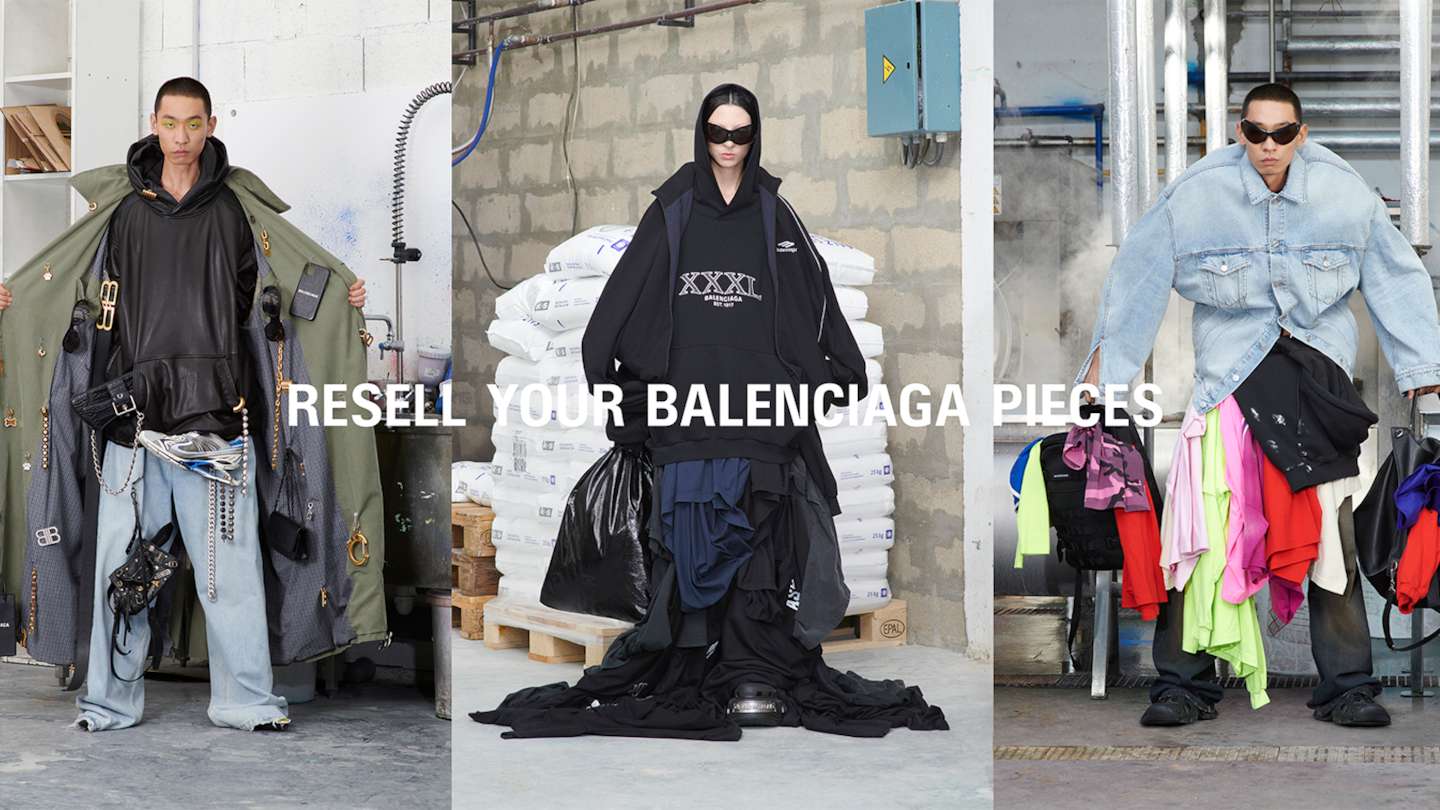
The Business of Fashion
Agenda-setting intelligence, analysis and advice for the global fashion community.

Agenda-setting intelligence, analysis and advice for the global fashion community.

For the last 18 months, Balenciaga has conducted a quiet resale experiment. Now it’s rolling out the programme more widely, becoming one of the first major luxury brands to test fully integrating a secondhand service into its business model.
The “re-sell” programme allows customers to sell their pre-loved “Triple S” trainers or “Hourglass” handbags directly through the brand, earning cash or credit that can be spent on new Balenciaga items.
Its launch adds weight to a significant and rapidly accelerating shift in luxury attitudes towards the fast-growing secondhand market.
Once seen as a threat that could cannibalise sales, encourage counterfeiting and hurt brand image, it’s increasingly viewed as a strategic (if emerging) opportunity to meet consumer and regulatory demand for more sustainable business models, encourage customer loyalty and engagement and reinforce the long-term value of luxury products.
ADVERTISEMENT
Though notable holdouts like Hermès and Chanel remain, many brands are either already experimenting with resale models or signalling their intention to do so. But the channel must still prove its benefits as both an environmentally and financially sustainable business model.
While the market is growing rapidly — estimated by BoF Insights to expand up to 20 percent from 2020 to hit $67 billion by 2025 in the US alone — most consignment sites have yet to show they can turn a profit.
Meanwhile, delivering on resale’s sustainability promise will require brands to develop today’s experiments into substantial revenue streams that can eventually displace primary sales.
Balenciaga’s new programme is an interesting and early test case that represents one of the boldest moves yet into the market by a storied luxury brand, embedding resale into the customer journey on the brand’s website.
The label has partnered with Reflaunt, a white-label tech platform that provides brands with the architecture to run their own resale programmes and plugs them into dozens of marketplaces globally.
That takes care of a number of potential pain points: Balenciaga retains control of pricing, presentation and authentication, without having to handle the transactions itself; logistics costs are baked into an item’s price and will vary depending on where the seller and buyer are located; targeting multiple marketplaces maximises the chances of a swift sale; and the challenge of customer acquisition becomes an opportunity for retention.
“It’s really a leap of faith and not really the values we recognise in luxury today,” said Reflaunt founder and chief executive Stephanie Crespin. “It’s helped move luxury values to a different place.”
Reflaunt’s investors include Balenciaga CEO Cédric Charbit, while its clients include Harvey Nichols and Net-a-Porter, and it’s part of LVMH’s start-up accelerator.
ADVERTISEMENT
To be sure, other brands like Coach and Oscar de la Renta have opted to develop resale as a direct sales channel. Coach is planning to roll out its (Re)Loved programme currently available in North America to Europe and Asia in the coming year. Another approach that brands including Gucci, Burberry and Alexander McQueen have tested is a partnership with existing marketplaces, like The RealReal or Vestiaire Collective.
Many are still simply laying the groundwork, eyeing how the market is evolving or investing in supporting technologies like digital labelling that can help smooth out the labour-intensive process of authentication.
But there are signs investment is likely to speed up.
Balenciaga’s parent, the French luxury conglomerate Kering, acquired a 5 percent stake in Vestiaire Collective last year, while British department store chain Selfridges has said nearly half its sales will come from recycled products or services like resale by the end of the decade. Farfetch CEO José Neves laid out a plan to reposition Yoox as an “end-of-cycle and circular fashion destination” by adding resale to its offering following the August e-commerce megadeal that saw Farfetch take a near 50 percent stake in Yoox Net-a-Porter.
“The secondhand market is a real transformative factor in luxury,” Kering CEO François-Henri Pinault told analysts in February, highlighting that the company’s investment in Vestiaire “gives us a front-row seat on this new trend, and it enhances our ability to influence the future of our industry.”
For more BoF sustainability coverage, sign up now for our Weekly Sustainability Briefing by Sarah Kent.
The fashion industry continues to advance voluntary and unlikely solutions to its plastic problem. Only higher prices will flip the script, writes Kenneth P. Pucker.
The outerwear company is set to start selling wetsuits made in part by harvesting materials from old ones.
Companies like Hermès, Kering and LVMH say they have spent millions to ensure they are sourcing crocodile and snakeskin leathers responsibly. But critics say incidents like the recent smuggling conviction of designer Nancy Gonzalez show loopholes persist despite tightening controls.
Europe’s Parliament has signed off rules that will make brands more accountable for what happens in their supply chains, ban products made with forced labour and set new environmental standards for the design and disposal of products.